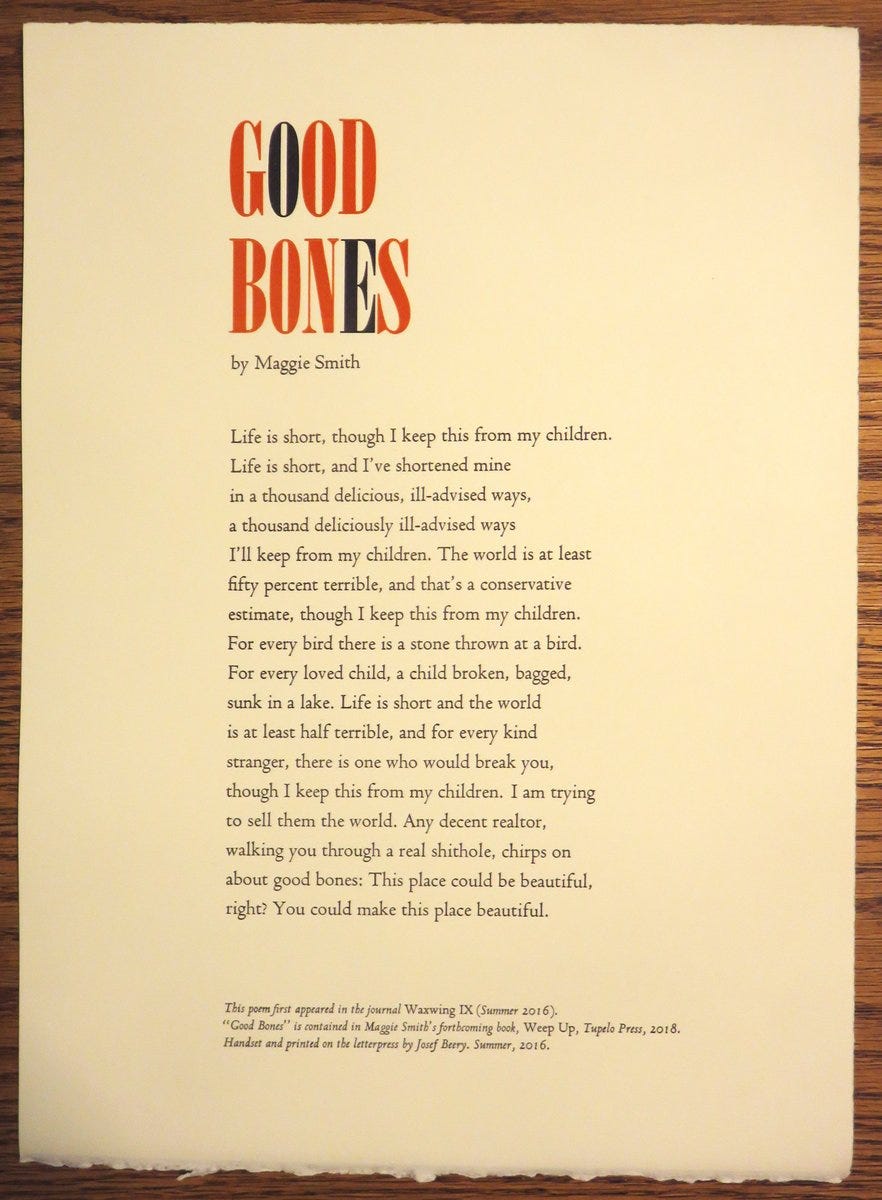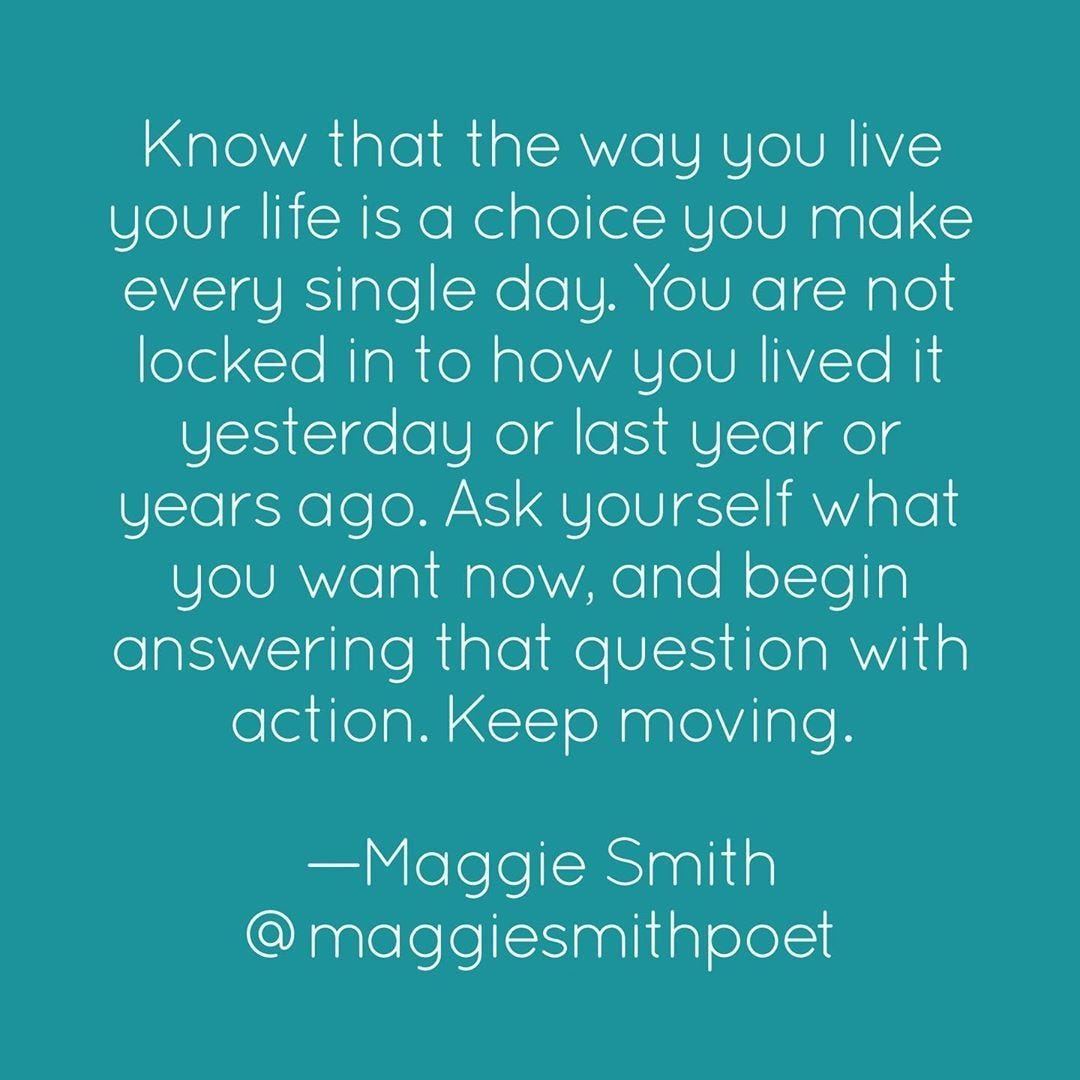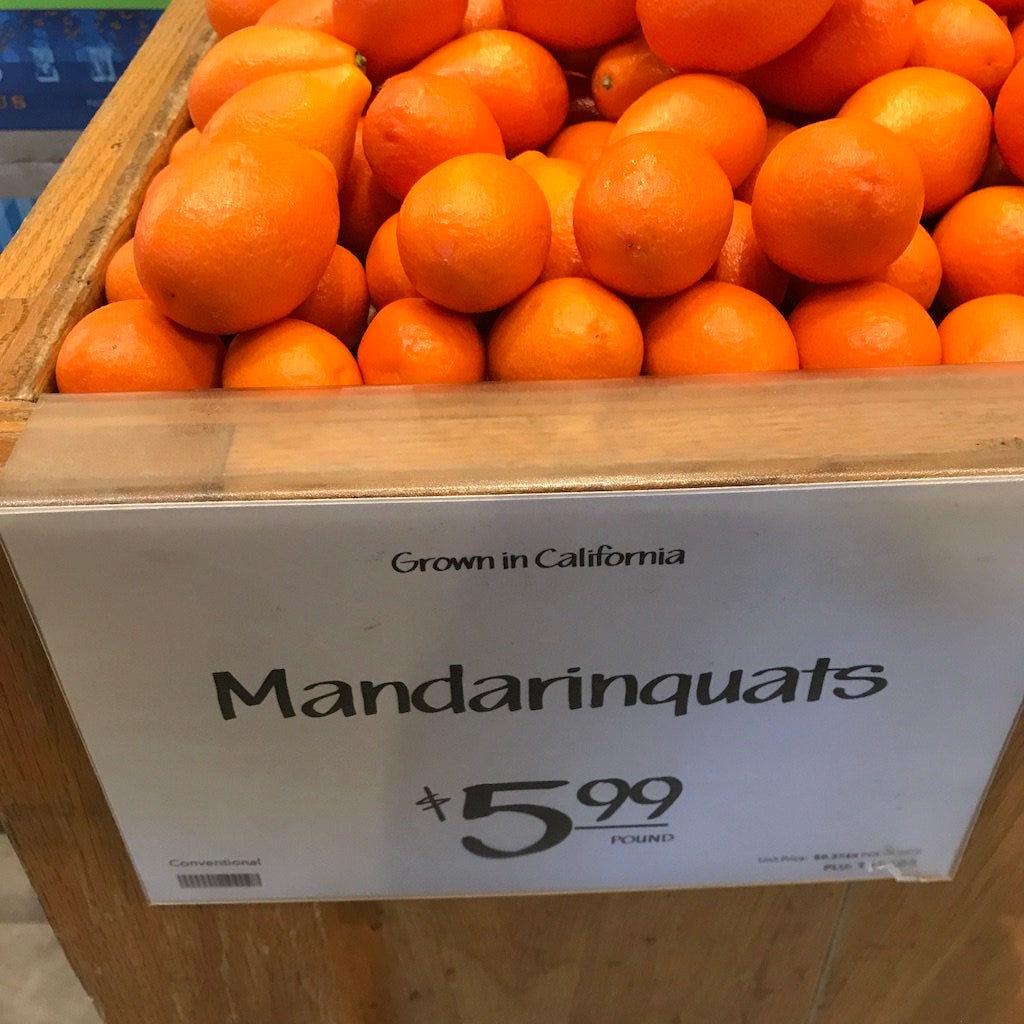Welcome to The Experiment, where we’re taking life lessons from a poet, which historically has been ill-advised, but we’ll make an exception for the exceptional Maggie Smith. Speaking of exceptional, Jessie Daniels draws historical parallels with mandarinquats (really) and Robin Whetstone embarrasses herself with strangers.
And as always, we remember who we’ve lost and offer recommendations on what to do (escape Zoom), read (Julian Barnes’ scoop on what we knew about Russian interference), watch (the Oscar-nominated Another Round), and listen to.
But first, I want to tell you a story about my friend Maggie Smith.
Maggie Smith’s fame is a conundrum. She is not that Maggie Smith, the actor, but among poets she is the Maggie Smith. You might have read her career-making poem “Good Bones” or seen Téa Leoni’s character recite it on Madam Secretary. The poem, with its coexisting images of children either loved or broken, has an almost Russian optimism. That’s the poem above; if you haven’t read it, read it now. We’ll wait. It’s worth it.
“Good Bones” spoke to the horror that was 2016. I bought a print and framed it in glass. I championed the poem relentlessly to make sense of the funhouse mirror the news had become. I was not alone in my enthusiasm—she got profiled in the Washington Post, PRI called it “The Poem of 2016,” there was a special printing, Wall Street Journal headlined her “A Poet for Times of Trouble”—but I may have been the most sincerely nit-witty. We became friends, digitally.
At the time, she needed friends. Her husband, who’d been with her since college, the father of her two children, handled her success poorly. He left. About that time, she tossed off a tweet proposing a lark: “photo essay that won’t happen: Divorced woman drives her rumpled c. 2005 wedding dress across the country and takes photos of it in various locations. It’s a metaphorical Weekend at Bernie’s sans stapled-on-toupee and sunglasses, because the dead thing is the marriage.”

And in the way that Twitter can sometimes platform serendipity, one of her favorite bands replied. “This would be a song called ‘Picture of My Dress,’” tweeted The Mountain Goats.
This story is also about that song, but the song is only part of the story because the story is about of the rest of her life. She said she hasn’t “figured out the plot yet but [is] hoping for a happy ending.”
I shared the advice I was given during my year as a foreign exchange student in then-West Germany: Say yes. Unless it’s illegal or unsafe, accept any offer to do something. See the world people want to show you. I told her how that advice got me through my own divorce and into a happy marriage full of adventure.
“I'm giving myself this directive because I tend to say no when in doubt—because the devil you know is a safer bet, right? But not an interesting bet at all,” she replied.
On social media she’d taken to publishing quote graphics such as the one below, advice she was clearly giving to herself first before sharing it on Instagram. Every day came another reminder to “revise the story you tell about yourself,” to “imagine the clearing” on the “other side of this dark forest,” and perhaps best of all, “to stop thinking of change as interruption to a story.”
“Accept that sometimes dismantling has to happen before you can build,” she wrote one day. “As you look at the mess of life’s pieces and parts around you, trust the materials you need are there. Start sorting: Which can go? Which should stay? How will you use them? Start now.”
And every day, each offering concluded with the kinetic imperative to “keep moving.”
In July 2019, I made a suggestion to Maggie that writers generally hate… Hey, you know what would make a good book? I envisioned a colorful book for sale near cash registers in airport gift shops, offering travelers encouraging wisdom during their journeys. She told me she already had a book deal to deliver Keep Moving: Notes on Loss, Creativity, and Change.
“Divorce lawyers are not cheap, as you know,” she wrote.
“Yeah, but poets make BANK,” I wrote, which she, a lifetime providing evidence to the contrary, thought so hilarious that she replied with four laughing emojis.
“I mean, you're paid by the meter,” I answered.
All dad jokes are at least fifty percent terrible, and that’s a conservative estimate.
This is also a story about that book.
We made plans to get together for dinner in San Antonio last March. I was in town doing book research of my own, she had a writers convention. This was back when tech companies were pulling out of CES and the Mayor was deciding whether to shut down SXSW. Her convention got cancelled, my research cut short. We retreated to safety, me to finish a book, her to… well, what exactly? Writers write, but do poets … poet? The year, admittedly, felt like undergoing emotional dentistry without Novocain, much less laughing gas, so by the time Keep Moving came out last October, it went straight to my shelf. I didn’t think I needed any more lessons on resilience.
Then I got my first shot, scheduled the second, and, in short order, accepted a new job. Suddenly the next phase of life could be calendared. Anxiety about moving from my cocooned quarantine into a new life of commuting into an office overwhelmed me. I’m just supposed to go back to the way things were, with rushing around in the morning, sitting in traffic, and, you know, people? I’d have to iron shirts, and not only was I pretty sure my shirts no longer fit, I had no clue where the iron was. Also, pants? Oh my god. Shoes! It wasn’t exactly a panic attack, but it sure wasn’t peacetime.
Pants.
For a long time, the prospect of intentionally building my life after the pandemic had been a professional and personal curiosity, everything phrased in the conditional and seen through an optimistic prism. We would apply what we’ve learned during the pandemic and construct a more holistic existence. When my family and friends had imagined a life inoculated against the plague, we had only imagined what we wanted, missed, and desired: hugs, travel, and restaurants.
But when that someday future is a precise day on the calendar in a couple weeks, the gauzy filter is pulled from the lens, and the future comes into clearer view with all its wrinkles and discolorations. Again: pants.
It was a coincidence that the reality of the shots and the job fell around my birthday, the anniversary of the pandemic. I finished a Sarah Bird novel, the excellent Virgin of the Rodeo. Not wanting to be especially challenged—It’s my birthday, dammit! Why am I so tense? Shouldn’t I be happy?—I took Keep Moving off the shelf and put it to work.
Maggie, I apologize. I had no idea.
Again: pants.
Reader, if you’re stressed out about how to rebuild your life coming out of a transformative, painful process, you could do worse than read a kaleidoscope of a memoir by a poet who climbed out of the crater of a failed marriage. Do you feel like you’ve been to hell and back? Lucky you! Maggie knows the way.
But Keep Moving is more than a series of colorfully designed meditations. It’s like Maggie took the book I imagined sitting next to the gift shop cash register, stuck it into a blender with the journal she kept during the divorce, and retrofit it into a memoir. Unburdened by the conventions of narrative long-form non-fiction, a poet can do devastating things with prose. Keep Moving is the aphoristic corollary to Mark Twain’s protest that if he’d had more time he would have written a shorter letter. Given a whole book, Maggie tightly constructed a memoir.
Reading it, I began dog-earing pages to share with you, but soon there were so many that excerpting them all would have violated copyright law. If you are looking for guidance out of the pandemic mindset and into whatever is going to pass for normal next, Keep Moving is the ticket. I will limit myself to this:
Try to shift your thinking away from loss and toward growth. Consider this difficult time a “gap year” between your last life and what might happen next. Think of it as the first (messy, brave, hard, exhilarating) year of your new life. Keep moving.
Halfway through, I realized just how bravely she’d written this book, not because of her honestly but because of where she had placed herself in the book. It’s not a straight memoir but a new kind of creation. The structure of Keep Moving mirrors her own metamorphosis. This book isn’t just about her but a creative result of her life.
This is a story about how my friend Maggie turned her life into art.
If it sounds like I’m making too much of this, I counter with the Mountains Goat, who late last year made good on their tweet. For you see, about the same time as Keep Moving was published, the Mountain Goats released “Picture of My Dress,” a song about a woman taking the wedding dress from a dead marriage on a road trip. She, along with one of her favorite bands, had turned her life into something entirely different than the sum of its parts.
Consider this difficult time a “gap year”
Now I’m beginning to look at the next phase of my life as something more than the sum of all pants. I’m looking forward to what’s next with curious anticipation. I’m going to keep moving, which is how we end up where this story was headed all along.
Keep Moving includes a conversation Maggie had with her daughter about how blue sky fills the space where a branch used to be after it’s cut. Your gap year is almost over. What are you going to fill that space with?
“Ask yourself what you want now, and begin answering that question with action,” writes Maggie.
We have been focusing a lot in The Experiment on the public traumas of our gap year, but this story isn’t about what has happened. This story is about what you want to happen next and how you answer that question.
Maggie Smith is a bomb ass writer. Click here to buy Keep Moving: Notes on Loss, Creativity, and Change, and here’s where you to to pre-order Goldenrod: Poems.
Dolley's Mandarinquat
by Jessie Daniels
Not everyone can draw a parallel between the exotic citrus aisle at Whole Foods and Dolley Madison, but not every observer sees the word as keenly as Jessie Daniels. Besides, we hear vitamin C is good for one’s eyesight.
Stranger Danger
by Robin Whetstone
The advice not to talk to strangers is usually intended to protect you from the strangers. With Robin Whetstone, it’s reversed. You never know what she’s going to say to someone for no good reason at all.
Who we’ve lost
This Korean War vet
This NOLA DJ
How we’re getting through this
Escaping Zoom
Not printing lies
Whipping TikTok coffee
Holding “scientific weddings”
Playing Dungeons and Dragons
Trying to get this song out of my head
Touring Goya’s Graphic Imagination at the Met
Making seared scallop pasta with burst tomatoes and herbs
What I’m reading
Julian Barnes: “The Intelligence on Russia Was Clear. It Was Not Always Presented That Way.” - /screams internally/
But one of her briefings, in which Ms. Pierson told lawmakers Russia favored Mr. Trump and was working for his re-election, prompted outrage among Republicans and contributed to the ousting of Joseph R. Maguire as the acting director of national intelligence. Mr. Evanina was then put in charge of briefing Congress, a role he was abruptly thrust into with little preparation, officials said.
For Mr. Evanina’s first meeting with lawmakers on election security last March, the Office of the Director of National Intelligence, then run by Mr. Grenell, prepared a document that tried to temper Ms. Pierson’s February warning by cautioning that officials had not concluded that Russia was backing Mr. Trump.
“The I.C. has not concluded that the Kremlin is directly aiding any candidate’s re-election or any other candidates’ election,” an unclassified summary given to lawmakers said, using shorthand for the intelligence community. “Nor have we concluded that the Russians will definitely choose to try to do so in 2020.” …
But the intelligence community ombudsman said in January that there were substantive differences between talking points for briefing Congress and what the intelligence community really thought.
The newly declassified report showed that the March briefing was at best misleading to Congress and backed Ms. Pierson’s February testimony.
Aisha Harris: “The Agony And Subversion Of The 'Promising Young Woman' Ending” - I love how this movie plays with your expectations to land the punch.
How do you like your revenge served on screen – via torture? In flames? A massive bloodbath?
How about ... via text message?
Monica Hesse: “‘It’s race, class and gender together’: Why the Atlanta murders aren’t just about one thing” - This was illuminating and hard to read.
A singular narrative is a tidy narrative. A singular narrative allows law enforcement — and yes, the media — to perpetuate "lone wolf" theories, to chalk up violence to one man's sex addiction or one man's racism, to proffer that if the one bad man is caught, the problem is solved.
Ryan Holiday: “This Is the Secret to Business and Artistic Success” - There’s an Easter egg in here for book writers.
How can you do a good job of making stuff for your customers if you don’t have a relationship with them? The short answer is, you can’t. Publishers are quick to tell authors about what audiences like and don’t like, but where are they getting this information? Not from the source, that’s for sure!
Sally Jenkins: “NCAA’s message to women’s basketball players: You’re worth less” - This is a deadly read.
Here’s the deal: The NCAA needs to fix this — and fix it now. Otherwise, it’s just one more reason for Congress to legislate it out of existence.
Kevin Walling: “Turns out Americans actually like competent government” - Good rundown on how well things stand for Biden right now.
The Biden administration’s markedly different approach from its predecessor’s regarding managing the crisis — namely putting the president front and center with regard to vaccine announcements, distribution and supply chain management — has clearly been a winning strategy.
WaPo: “How the pandemic is reshaping education” - A lot of ponies here.
“There may be an opportunity to reimagine what schools will look like,” Education Secretary Miguel Cardona told The Washington Post. “It’s always important we continue to think about how to evolve schooling so the kids get the most out of it.”
What I’m watching
The One was hot garbage, and I loved it; likewise, Ginny & Georgia.
Another Round, streaming for free on Hulu, got a surprise best director nomination for Thomas Vinterberg. The movie is a project that, partly by dint of the subtitles, requires your attention but rewards it many times over.
What I’m listening to
We crossed over 200 songs this week on our Spotify playlist. This week is an embarrassment of riches, thanks in no small part to the soundtrack of Ginny & Georgia.
But first, Jon Batiste has come into his own with the 2020-influenced We Are. The title track uses his high school marching band as a horn section. Y’all. “We Are” is marching music, but for a different reason.
Staying on the 2020 vibe, A.A. Williams recorded an album of covers during quarantine. Her take on the Pixies’ classic “Where Is My Mind?” is well-taken.
And this has nothing to do with 2020 or Ginny & Georgia, but “Texas Drums Pt I & II” is so good that I’m never not going to see a Pottery concert again if I can help it.
Amala Ratna Zandile Dlamini, better known as Doja Cat, is more than her novelty hit, “Mooo!” Check out “Go To Town.”
“Coo Coo,” by Canadian indie band Weaves, sounds like what I feel like when I’m happy.
Ashe has chops and a backstory. Raised in a conservative Christian household where she couldn’t listen to secular music, her grandfather introduced her to the classics — the Beatles, Bob Dylan, that sort of thing — and she ended up at the Berklee College of Music like a certain father-in-law. Now she’s writing solid pop songs like this one, “Sometimes People Suck.”
Anna of the North is a Norwegian singer-songwriter whose “Leaning on Myself” charmed me.
Just discovered Laura Mvula, whom Prince was a big fan of.
If Tom Petty were the “Americana RuPaul,” he would be Aaron Lee Tasjan.
What do you think of today's email? I'd love to hear your thoughts, questions and feedback. I might even put ‘em in the newsletter if I don’t steal it outright.
Enjoying this newsletter? Forward to a friend! They can sign up here. Unless of course you were forwarded this email, in which case you should…
If your new year’s resolution was to lose weight, try Noom, and you’ll quickly learn how to change your behavior and relationship with food. This app has changed my life. Click on the blue box to get 20% off. Seriously, this works.
Headspace is a meditation app. I’ve used it for a couple years and am absolutely shocked at how much it’s taught me about managing my inner life. Try it free for a couple weeks. Don’t worry if you’ve never done it before. They talk you through it.
I now offer personal career coaching sessions through Need Hop.
We set up a merch table in the back where you can get T-shirts, coffee mugs, and even tote bags now. Show the world that you’re part of The Experiment.
We’ve also got a tip jar, and I promise to waste every cent you give me on having fun, because writing this newsletter for you is some of the most fun I’ve had.
Forget the Alamo: The Rise and Fall of the American Myth by Bryan Burrough, Chris Tomlinson, and myself comes out June 8 from Penguin Random House. There is no better way to support this book than to pre-order a copy. You’re going to love reading what really happened at the Alamo, why the heroic myth was created, and the real story behind the headlines about how we’re all still fighting about it today.









